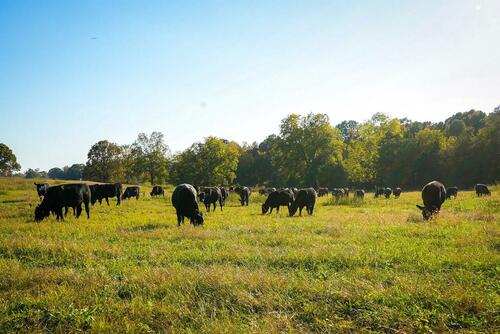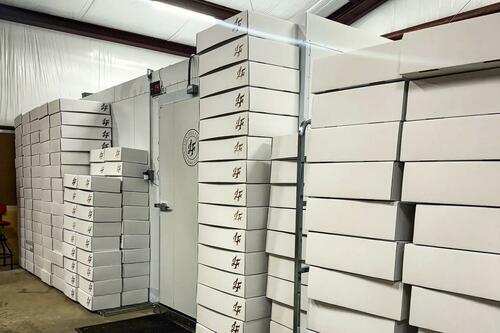Authored by Kevin Stocklin via The Epoch Times (emphasis ours)
In a time when numerous independent cattle farmers in America are going out of business each year, and cattle herds are at a 70-year low, one determined couple believes they have discovered a way to salvage their family farm.
The landscape of livestock farming has drastically changed from its traditional roots, where ranchers would participate in competitive markets with pricing based on quality and market demand.
Presently, four major meatpacking corporations—U.S.-based Cargill and Tyson Foods, and Brazilian-based JBS and National Beef/Marfrig—collectively purchase 85 percent of all cattle in the United States, leaving many former independent ranchers as contract laborers for these corporations, often selling at prices that do not cover their expenses.
As a result, there has been a significant decline of 655,000 cattle farms since 1980, with an average of 20,000 ranches going out of business per year in the United States over the past five years.
After experiencing financial losses under this system for years, Avery and Marc Wrigglesworth, owners of Lily Hill Farm in West Point, Georgia, made the decision to forge a different path. They believed that the only way to survive was to establish their own market that directly sells to consumers.
While Avery grew up on the Georgia farm, Marc was raised on Jersey, a small island in the English Channel. They crossed paths in Jersey while working office jobs in the finance industry.
In 2019, Avery was informed by her father that the family farm, originally established by her grandfather after returning home to Georgia from a POW camp in Germany after World War II, was going to be sold. Due to debts, the herd had been sold off, leaving only 80 cattle, and the farm had spiraled into what Marc describes as a “death spiral.”
What remained was no longer generating enough revenue to sustain the business. Avery and Marc made the bold choice to resign from their jobs and relocate to Georgia with hopes of rescuing the farm.
“We are now the third generation, and there’s always been something that’s drawn me to this place,” Avery shared with The Epoch Times. “It would have broken my heart to see it parceled up, and houses and subdivisions built all over it.
“I just felt like it needed to have one last chance to see if we could turn it around.”

Overcoming Challenges
They quickly realized that the farm’s current operation was unsustainable.
“We were simply selling the calf crop at the local stockyards—that’s generally how these cow-calf operations sell,” Marc explained. However, the prices offered by processors were insufficient to cover their expenses, prompting them to explore other options.
Instead of selling to the major packing companies, they opted to sell directly to consumers.
“It was a leap of faith, but we had no other option,” Avery stated. “In the three years we’d been running this place, we had a net operating loss of nearly $600,000, so it was either pack it in and leave with our tail between our legs, or take an even bigger leap and see if this will work.”
Transitioning to direct sales required significant time and financial investment, depleting their savings.
“We just had to bite the bullet and keep everything back for two years with no farm revenue,” Marc recounted.
Avery had already established a following on Instagram, providing a foundation of customers. During the transition period, they developed their online store, expanded their social media presence, and honed Avery’s photography skills for consistent online content.
They partnered with a company in Alabama for meat processing. Once the beef is processed, it is returned to Lily Hill Farm, stored in a walk-in freezer, and shipped to customers via UPS with dry ice packaging.
Two years ago, Lily Hill Farm launched its website and online store, offering pasture-raised beef directly to consumers “without additional growth hormones, antibiotics, or animal by-products,” as stated on the website. Through their social media platforms, Avery and Marc strive to establish personal connections with customers.
“They want to know where their products are coming from,” Avery explained. “They want to know it’s a family behind it, and they want to know the people and the story behind the products they’re purchasing.”
After years of financial struggles, this new business model has revitalized the farm’s profitability.
“When we launched in April of 2022, we hit the ground running, and it’s been unstoppable ever since,” Marc shared.
Read more here…
Loading…


